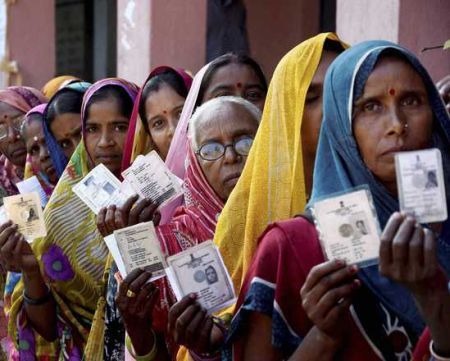 Legalisation of betting will lead to better predictions of election results. However, the satta market is not a good tool to rely on for the forecasts.
Legalisation of betting will lead to better predictions of election results. However, the satta market is not a good tool to rely on for the forecasts.
The media shares a symbiotic relationship with taxi-drivers. While traveling with them, one can strike a conversation on any subject. Be it quantum mechanics or Chola bronzes, cabbies can always be relied on for quotes on any subject.
It makes sense to interview a cabbie while covering an election, as he is on the street, sensitive to cross-currents. Another media ritual that is seen as a useful tool to forecast election results is checking out betting odds in the local satta market.
However, if looked at closely, both these ways doesn’t work. The cabbie is from a specific socio-economic stratum. In many places -- like New York, Kolkata, Karachi and Mumbai -- the cabbie also tends to be an outsider.
On the other hand, the satta market is an inefficient prediction tool for many reasons.
Bookmakers, including satta bookies, set odds. A bookie keeps a running count of cash-in and potential maximum payout. He will reset the odds to minimise payout. (The spread in the bookies’ favour is ‘vigorish’). This distorts the market as even a single large bet can skew the odds.
For example, say 100,000 punters bet one ticket at Rs 10 each on a given political candidate, A. That is Rs 10 lakh on A. Now, one very rich punter fancies candidate B, and bets Rs 20 lakh on B. The odds swing, making B a favourite.
While this makes financial sense, in an election, a candidate favoured by 100,000 punters is more likely to win, not the one backed by that Kuber-incarnate?
Given the Indian electoral system, the racecourse totaliser (tote) would be a near-ideal model for election betting.
Just like races, elections are first past the post and also feature multiple candidates at the constituency-level. Also, there are multiple parties in aggregate. The only difference: 'placing' second doesn't count in an election.
A tote offers tickets in Rs 10, or multiples thereof, making it affordable for everyone. A range of bets are offered. The turf authority running the tote takes the commission and taxes payable off the top. The remainder of the betting pool is divided by the number of winning tickets to calculate the payout.
A range of bets would be available in a possible election tote, including winners (in constituencies and aggregated) and also spreads, predicting the range of seats a party is likely to win. Many other bets can also be set up, such as spreads on win-margins, the number of convicted criminals who will win, etc.
The satta market is illegal, secretive and exclusive. A walk-in without introduction will not get the time of day, let alone be allowed to bet. Moreover, bets under Rs 5,000 are not worth it for a bookie as he must pay law enforcement, employ runners, security staff, accountants, and deploy hundreds of cellphones with thousands of SIMs.
The satta bookie sets odds manually to keep the ‘vigorish’ high. Satta also offers limited markets, with few spreads and wins. All this stacks bias upon bias. Only punters with deep pockets who know the game can bet on an election. Given all this, satta is near-useless as a prediction tool, especially for elections. It also generates revenue only for crooked civil servants, not for the exchequer.
This is a pity. Legalisation of election betting would allow satta to be superseded, or complemented, by totes with low-priced tickets reflecting public opinion better. The Election Commission could run a tote with every election. Access to that data would help psephologists and politicians to review and tweak their models.
In moral terms, a tote on elections would be no different from running a lottery. It would also be totally in line with the majoritarian sentiments, given the religious enthusiasm with which the vast majority of Indians gamble. It is a great pity that a supposedly majoritarian and business-friendly party cannot display the minimal imagination to legalise this potentially huge market.










